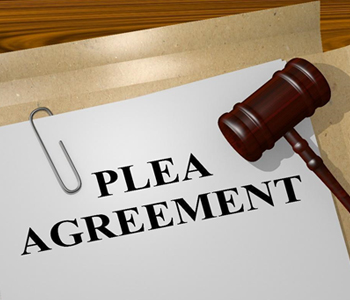The Process Of Negotiating Federal Plea Offers

This dynamic is the primary reason why 90% of federal cases are resolved by way of a plea and do not go to trial. Federal sentencing guidelines have a built-in trial penalty that increases a defendant’s potential sentence, sometimes as much as twofold, if they opt to go to trial and lose rather than take a pretrial plea offer.
It is important to understand that the current federal plea bargaining practice set by the Department of Justice requires federal prosecutors to seek and demand a conviction on the most serious count of an indictment once a chase is charged. This policy technically forbids them from dismissing the most serious charge in any indictment, and brings with it two consequences:
- Plea negotiations take on an added importance prior to indictment because pre-indictment negotiations enable the parties to affect the top charge, the most serious charge of an indictment.
- If a defendant can negotiate a reduced most serious offense prior to indictment, that is incredibly advantageous.
- As a result, federal prosecutors will frequently begin the plea negotiation process early in federal criminal law cases. There are strong incentives that encourage sincere early plea negotiations by both parties.
If there are pretrial motions, defendants should explore, research, file, argue, and litigate all relevant and necessary legal issues in court prior to deciding to accept a plea offer and taking a plea in court. If there is a robust, fact-driven defense that can be used at trial, that should be investigated and built out before accepting a plea offer and entering a plea in court.
If a defendant and their lawyer decide that it is in their best interest to accept a plea offer and enter a plea of guilty, then the actual plea taking process includes:
- Go to court;
- Be placed under oath;
- Plead guilty;
- Make out a factual basis;
- This is a defendant telling a judge what they did that makes them think they are guilty of the charged offenses.
- Receive a sentencing date from the judge.
From here, the case would enter the sentencing phase.
In contrast, if your federal criminal law case goes to trial, the general timeline is much longer. There are several reasons for this, and it may seem odd since the federal criminal justice system has a relatively strict speedy trial act that states cases are supposed to go to trial in just over 70 days from the time of the arraignment on the indictment.
This is simply unrealistic: the scope of federal criminal investigations, the amount of defendants that are frequently part of an indictment, the complexity and size of the discovery, and the requirement that pretrial motions be filed and litigated in advance of the trial, all work against this time frame being practical. Compiling the discovery, getting it to the defendant and their lawyer, reviewing the discovery, filing pretrial motions, hearing those motions, and the possibility of plea negotiations all mean most cases do not wrap up in under a year.
However, there is good news — if a defendant goes to trial, wins, and is found not guilty, that is the end of the case. The defendant is acquitted and can move on with their life, and the case is completely over in most instances.
With the guidance of a skilled attorney for Criminal Law Cases, you can have the peace of mind that comes with knowing that any all avenues of defense will be researched and explored. For more information on Federal Criminal Law in Michigan, a free initial consultation is your next best step. Get the information and legal answers you are seeking by calling (248) 509-0056 today.

Call Today For Your Free Case Strategy Session
(248) 509-0056
